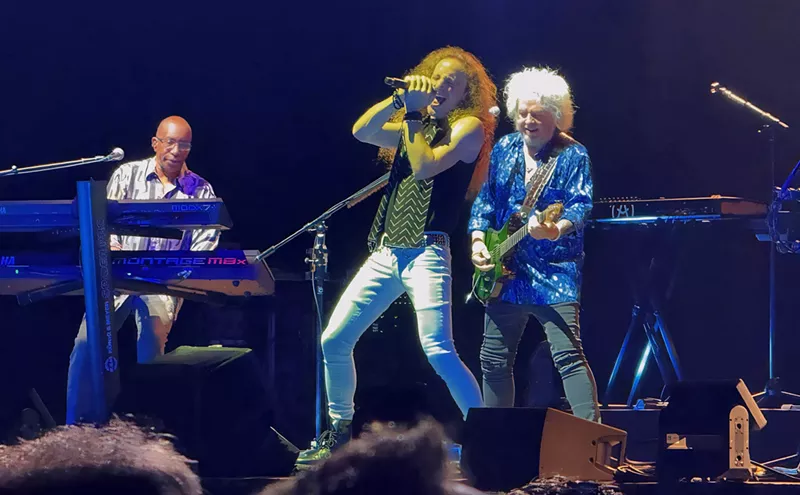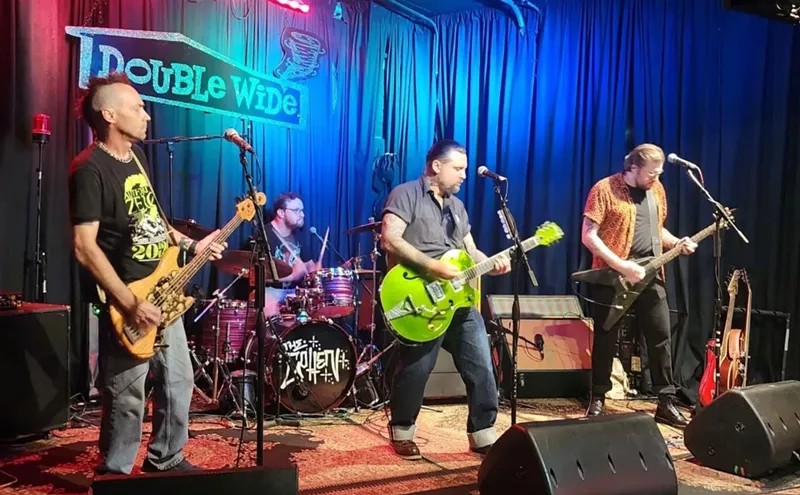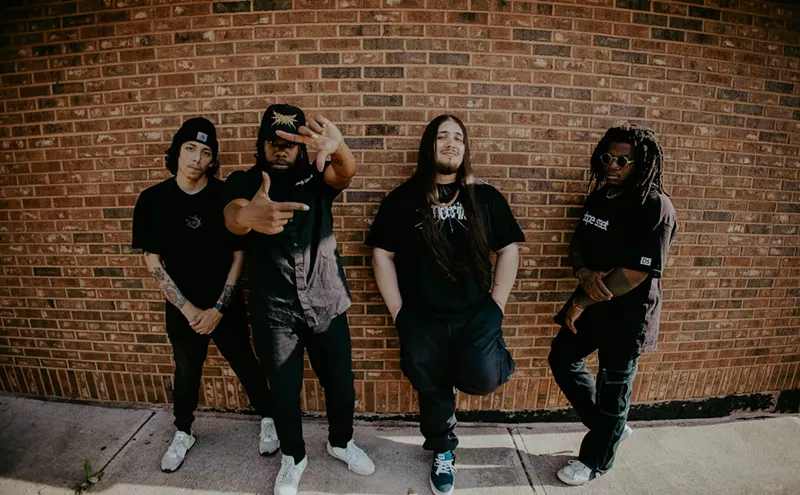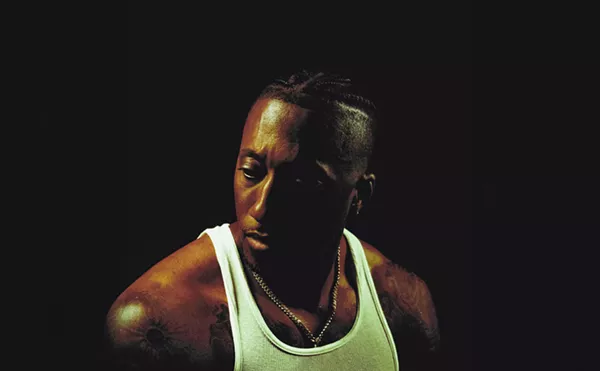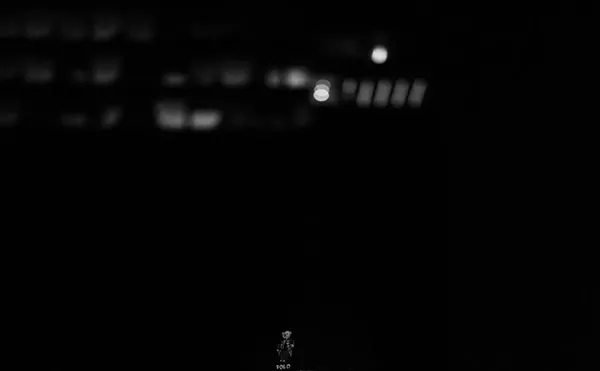For a while there two years ago, it seemed to Alejandro Escovedo as though it were all crumbling.
His legendary rock 'n' roll career. His physical health. His mind. His beloved Austin, a place he had helped create as much as it had created him.
About the only thing Alejandro could see clearly was his new wife, Nancy Rankin Escovedo, with whom he had survived a near-death experience and who now held his hand tightly as they looked ahead into an uncertain future.
And then fate stepped in.
The winds of change engulfed the 65-year-old songwriter and his wife, and drew them to a hip hotel apartment in Dallas, a place filled with music and camaraderie and art. A place where Alejandro and Nancy now make their new home, find creative inspiration and outlet in their fresh start, and tell a new story about a future filled with optimism.
“It’s not over by any stretch of the imagination,” Escovedo said on a recent afternoon, surrounded by guitars and books and light in his breezy apartment at the Belmont Hotel in Oak Cliff.
Crowning his new chapter is his brand new album, Burn Something Beautiful, a collaboration with R.E.M.’s Peter Buck and Scott McCaughey of the Young Fresh Fellows, due out on Fantasy Records on Oct. 28.
The year behind him includes being completely cured after a 20-year battle with deadly hepatitis C; leaving Austin, his home of 35 years that claims him as its native son; and the couple surviving a hurricane on their honeymoon. Both of them were later diagnosed with post-traumatic stress disorder. Escovedo also had to come to terms with blackouts and bizarre behavior as well as a canceled tour that threatened to put the brakes on his career.
Ahead of him is an international tour with Buck and McCaughey, a brand new podcast he hosts and broadcasts from the lobby of the Belmont and ideas for projects to come: A coffee table book with his photographer wife, Nancy, an album with Los Lobos, duet projects and creating more of his signature theatrical shows.
“What I have always admired about you,” wrote Fantasy Records producer Bill Bentley, who was in the Portland, Oregon, studio for the recording of the new album, in a recent letter to Escovedo, “is that you know the traps in rear-view gazing, and through the years have never looked behind you long enough to find anything but encouragement. And then you are on to the future.”
The Burn Something Beautiful album is Escovedo’s first in four years, the longest he’s ever gone between solo records. It’s among his favorite works after 14 solo albums, the fruits of a career spanning four decades and genres from punk to alt country — and the spaces between and beyond.
The album, Escovedo said, is the reflection of a lifetime of giving body and soul to rock 'n' roll, as well as spending the past two years in a spiral.
“I’ve been doing this for a long, long time,” he said. “And having a different perspective about having survived hepatitis C and having survived a hurricane and finding love in a very beautiful way had such a profound affect on the record and my writing.”
Escovedo’s band on the album includes guitarist Kurt Bloch of the Fastbacks, drummer John Moen of the Decemberists and vocalists Corin Tucker of Sleater-Kinney and Kelly Hogan of Neko Case’s band, as well as an appearance by Los Lobos saxophonist Steve Berlin.
The album celebrates Escovedo’s early punk roots in San Francisco, with shouting vocals backing the rowdy opening track, “Horizontal”; stretches over to pop influences in the catchy “Sunday Morning Feeling”; and touches on one of his signatures — a good old heartfelt love song — in a tribute to his wife, “Beauty of Your Smile.” The song was written after a harrowing episode in 2015 when the couple were in the throes of PTSD.
‘A beautiful thing’
Alejandro Escovedo and Nancy Rankin, now 44, met at the Continental Club in Austin in November 2013, a classic, eyes-meet-across-the-room, instant infatuation. While dating over the next four months, they discovered that in the course of her 30 years in Austin, they had run in the same circles and even lived on the same block, but had never met.
“It just wasn’t the right timing,” Nancy said.
Escovedo, married a few times and the father of seven children, had by then called love a casualty of life as a career rock ’n’ roller.
“It’s just one of those things that’s never going to work for me,” he recalled thinking at the time. “And then I met Nancy, and my world completely changed. … It was really a beautiful thing.”
Around that time, he was looking for some professional traction in the wake of his 2012 album, The Big Station, during which he said he lacked focus.
“I kept touring but went through a lot,” he said. “I went through the breakup of my band, searching for new musicians, trying to find a new approach to my music and really just wanting to cleanse myself in a way. …
Through all of this, Peter and Scott and I decided we would write an album and would make our next album together.”
As the plans for the new album came together, Nancy and Alejandro got married in September 2014.
Then life quite literally hit Mother Nature’s fan, also known as Hurricane Odile.
Their honeymoon in Baja California, Mexico, brought Odile right to their doorstep, ripping off the front of the beachfront home they were staying in, prompting goodbye calls to their family in the U.S.
“We had told each other, well, if this is going to happen, at least I’m with someone who has made me very happy, and I love very much,” Escovedo said. “And we kind of just gave ourselves in to that.”
They survived, but felt abandoned, guilty, afraid — emotions that attached themselves to things like ugly childhood memories and dragged them to the surface.
It took them several days to get out of the hurricane-ravaged Mexican coast — and over a year for the trauma to begin to loosen its grip.
Nancy emerged sensitive to noise, while Alejandro experienced neurological seizures, doing things like pouring salt into everyone’s water at the dinner table or going off on the hostess at a restaurant, something the polite and friendly songwriter would not normally do.
People told them they looked shell-shocked, like they’d been through a war.
It occurred to no one that they were suffering PTSD, which would later be diagnosed and treated with therapy.
“At first we didn’t really know that we had it, but we knew something had changed dramatically,” Nancy said.
Still, Alejandro and Nancy kept going, planning a Sun-Ra style theatrical show about the hurricane featuring acting and spoken word, writing sessions with Buck and McCaughey and launching a popular tour.
In spite of his seizure episodes, which eventually caused the songwriting sessions to pause, everyone was excited. The tour was starting to sell out. The first gig in Seattle was outstanding.
Then in October 2014, Escovedo panicked in Portland, on the way to the dressing room moments before a sold-out show with Buck and McCaughey.
“We start to walk up the stairs to the dressing room, and I see all the people there, and Nancy is walking in front of me and I take her hand and I kind of go, ‘I don’t know if I can do this. There’s so many people,’” Escovedore called.
“Honey,” Nancy replied, “you played in front of 75,000 people with Bruce [Springsteen]. This is fine, don’t worry about it.”
But as soon as they got to the dressing room, “it started happening again,” he said. “I went into another spiral, and I couldn’t do the show.”
The show was canceled, Escovedo was in the emergency room all night.
“With tests and MRIs, and nothing,” he said. “And now Nancy is starting to tell them about our experience with the hurricane, and they’re starting to say, ‘Well, maybe that has something to do with it.’”
Buck was spooked by the incident, Escovedo said. In 1995, R.E.M. drummer Bill Berry collapsed on stage from a ruptured brain aneurysm.
After a doctor advised Alejandro to cancel the tour, he recalled, Buck begged him to follow his orders, saying the lost money and halted album project didn’t matter.
A few days later in Sacramento, Escovedo gave in. The six-week tour was canceled in October 2014. Everyone went their separate ways.
“Now things are starting to fall apart,” Escovedo said. “We lost a lot of money on the tour, our road manager is starting to become disinterested in me. You can just feel these things as a musician. I’d been through it enough.”
Alejandro and Nancy convalesced with family in Sacramento, where a neurologist pinpointed PTSD as the likely problem. Therapy followed, and Escovedo went to the Bay Area Tibetan doctor who had helped him after he collapsed from hepatitis C on stage in Phoenix in 2003 and was told he had one year to live.
She diagnosed that his adrenal gland was depleted, drained of adrenaline, “a life force,” as Escovedo described it. She prescribed herbs, teas and three months off.
So the couple went home to Austin in November 2014, six weeks into their marriage.
‘A matter of picking up the pieces now’
Alejandro’s favorite San Francisco Giants had won the pennant and the newlyweds’ love and bond felt stronger than ever as they headed into their first year together.
But during that stretch of recovery in the fall of 2014, things otherwise looked bleak, Escovedo said.
“So I lost my management, lost my road manger, I worked for three months without making a penny in order to pay everything back, and it was a hard time,” he said. “I was still doing some gigs but not as many, and things were starting to crumble, professionally. And I got another manager and that didn’t work out, and kind of feeling like I was on my own for a while. So it was a matter of picking up the pieces now.”
The next year, they decided to lay low and gather energy, trying their best to get better. He was still touring with his band, but not nearly as extensively as before.
After a year of quiet living, Nancy was hired in August 2015 to work on the set of the TV series Queen of the South, being shot for six months in Dallas. Off they went to live in the Belmont Hotel a month later, for what at first was a temporary stay.
While Nancy worked 18-hour days on set, Alejandro began a medical regimen to attack his hepatitis C.
After a few days in bed as the medicine kicked in, Escovedo awoke in his Belmont bed one November 2015 and “felt like I could fly through the air, knock down walls.”
“I felt like a new person. I felt like I was 24 again. I had that energy, and I felt like I’d been completely stripped of something,” he said. “It was amazing. It was a miraculous day. I’m not exaggerating.”
A trip to the doctor a month or so later confirmed it was gone. The disease, a 20-year, life-threatening burden, had been shed for good.
“We just jumped up and grabbed each other and started crying,” Nancy said. “It was a beautiful transformation to actually watch the disease leave his body — his skin color, his skin texture, his energy level, his eyes, his hair.”
After that, Escovedo said, the life force he had depleted came thundering back.
During the first half of 2016, the couple fell in love with Dallas, its diversity and art scene, The Kessler, the little health food store near their apartment, Jefferson Street restaurants that remind Escovedo of being back in his native San Antonio.
And they fell in love with the Belmont, a 1930s restored motor inn that caters to musicians and artists and that welcomed them with open arms.
A return trip to Austin confirmed that the fast-growing city, where corporations and high-rises were covering up the laid-back music town they once loved, was no longer a city they really recognized.
It’s a trend Alejandro sees not just in Austin, but in other cities where music once drove the scene.
“The world is changing, and we’re losing these wonderful little pockets of eccentricity to people who think they can buy it,” he said. “Money doesn’t buy the vibe. You create the vibe. If you don’t have the people there, the vibe is gone.”
So they chose Dallas as their new home, became the Belmont’s first permanent residents, and they never moved back to Austin.
Hotel owners Jeff Burns and Jordan Ford, as well as the staff who personalized the apartment, “took painstaking detail” and “made us feel like we’d really come home in a way,” Escovedo said.
“It was part of the healing, too, from the hurricane and the PTSD,” he said. “We had to kind of wash ourselves of the past and find something new.”
Leaving Austin for Dallas, coming as it did not deliberately but on the heels of happenstance, seemed like a natural progression — but it wasn’t easy.
“It was like leaving home for the first time, and I was going to a place I really didn’t know that much about,” said Escovedo , a San Antonio native who grew up in California and left home at 15. “I had such a history there [in Austin]. I was such a part of it, and I think I kind of, to some people, represented it in a way. It was very difficult.”
Jody Denberg, an on-air host at KUTX radio in Austin who, as former program director at KGSR and longtime best friend to Escovedo , witnessed the rise of his solo career in the 1990s, said the songwriter made an indelible mark in the Austin music scene.
“I don’t think you can overestimate his importance musically and as a member of the community,” he said. “He’s always been evolving, he’s always been here and that has inspired countless people in more than one generation, and I think that continues.”
Escovedo said the news comes as a shock to some fans who have spent decades watching up close as his career grew, running into him at Barton Springs, catching him live at Continental Club shows and Cactus Cafe and Austin City Limits, and listening to him on the town’s once-local radio station KGSR.
He told a recent audience that he’d moved to Dallas and was met with “dead silence.”
“It’s like someone had just phoned in a bomb alert. It’s crazy,” he said, laughing. “People in dead silence. They just couldn’t fathom that I had moved to Dallas. ‘Why would you do that?’ I said, ‘You’ve got to check out Dallas. You really don’t know it. And I didn’t know it, but now that I do, I’m very glad I made the move I made.’”
But while the Escovedos may have left, they visit Austin regularly for personal and professional reasons.
“Austin will always have a spot in our hearts,” Nancy said.
“People still embrace him as an Austin artist and a member of the Austin community,” said Denberg, who has been friends with Escovedo for 35 years. “His appearance has been almost as regular as when he lived here. I don’t know that his absence has been felt that keenly simply because he’s not that absent.”
Shaking loose from his deep foundations in the Live Music Capitol of the World proved to shake loose some creative inspiration as well, Alejandro said.
“It worked out to be one of the best things that ever happened for us, and what we went through, and the things we were trying to do to make ourselves happy again,” he said. “To feel comfortable and relaxed in order to keep creating.”
Springtime in 2016 and Escovedo was disease-free, much stronger in both body and spirit, and ready for what lay ahead.
“It was like, OK, here we go,” Nancy said.
It was time to make the new record.
After a few false starts and near misses, Burn Something Beautiful was recorded in Portland in April 2016.
“We rehearsed for maybe two or three days and went in and made the record,” Escovedo said. “And truly [it was] one of my favorite recording experiences I’ve ever had. And I think Scott and Pete did a job that took me to a place that was outside of my comfort zone, and yet was very much in the field that I love so much.”
In addition to the inspired songwriting partnership with McCaughey and Buck, collaborating with so many artists was a real turn-on for Escovedo and a signature of the best days of his career.
He’d performed with children’s choirs, jazz improvs, orchestras and artists like Springsteen and David Hidalgo and Judy Nylon and countless more. He’d worked with John Cale and Chuck Prophet and Fort Worth native Stephen Bruton.
Reclaiming some of those glory days banished that old feeling, two years ago, that he was professionally “on my own.”
The resulting album, Denberg said, “is one of his best ever, so he’s totally excited about that.”
“I don’t think I’ve ever seen Alejandro happier in his life, in the 35 years that I’ve known him,” Denberg said. “I don’t know that it’s necessarily a function of Dallas. I think first and foremost, it’s a function of his relationship with Nancy. They’re a really great fit, and they really support one another.
“But I also think that any time you make a new start and you’re moving somewhere new and enjoying it, that makes you happy.”
For their part, Alejandro and Nancy can’t ignore how the move to Dallas seemed to facilitate the rest of their lives falling back into place, strengthening them as both a couple and as artists.
“Look what’s happening since we’ve been here,” Escovedo said. “There’s been an abundance of goodness and blessings that have come from it.”

Audio By Carbonatix
[
{
"name": "GPT - Billboard - Slot Inline - Content - Labeled - No Desktop",
"component": "21721571",
"insertPoint": "2",
"requiredCountToDisplay": "2"
},{
"name": "STN Player - Float - Mobile Only ",
"component": "21861991",
"insertPoint": "2",
"requiredCountToDisplay": "2"
},{
"name": "Editor Picks",
"component": "17105533",
"insertPoint": "4",
"requiredCountToDisplay": "1"
},{
"name": "Inline Links",
"component": "18349797",
"insertPoint": "8th",
"startingPoint": 8,
"requiredCountToDisplay": "7",
"maxInsertions": 25
},{
"name": "GPT - 2x Rectangles Desktop, Tower on Mobile - Labeled",
"component": "22608066",
"insertPoint": "8th",
"startingPoint": 8,
"requiredCountToDisplay": "7",
"maxInsertions": 25
},{
"name": "Inline Links",
"component": "18349797",
"insertPoint": "8th",
"startingPoint": 12,
"requiredCountToDisplay": "11",
"maxInsertions": 25
},{
"name": "GPT - Leaderboard to Tower - Slot Auto-select - Labeled",
"component": "17357520",
"insertPoint": "8th",
"startingPoint": 12,
"requiredCountToDisplay": "11",
"maxInsertions": 25
}
]

